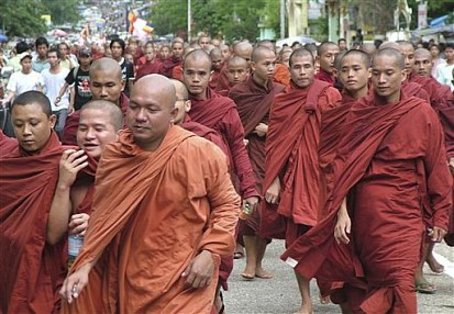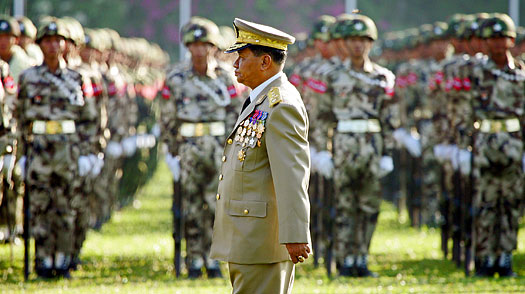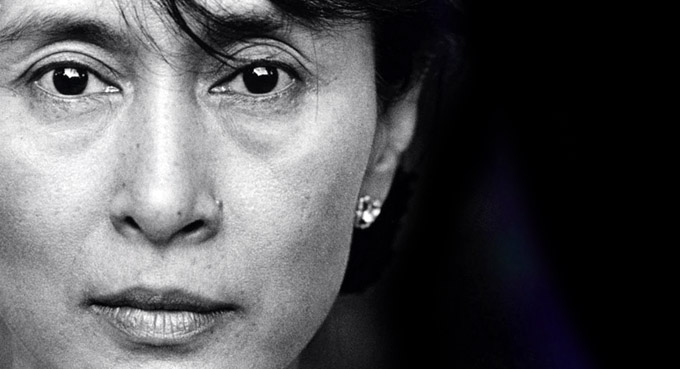 Most Burmese exile groups were skeptical about an announcement by President Thein Sein on 17 August that his government would allow dissidents to return to the country, but at least some welcomed the idea as something worth considering.
Most Burmese exile groups were skeptical about an announcement by President Thein Sein on 17 August that his government would allow dissidents to return to the country, but at least some welcomed the idea as something worth considering.
In a speech to local businessmen in Napyidaw, Thein Sein said the government would take a “benevolent attitude” toward exiles who chose to return. However, Thein Sein’s speech was “clearly nothing more than a public relations exercise aimed at improving the image of his regime in the international community,” said prominent activist Khin Ohn Mar, who is the coordinator of the Burma Partnership.
The situation has changed little since the country conducted sham elections in 2010 that were falsely thought to be a transition to civilian government. The political parties backed by the military junta won the majority of seats and Thein Sein, Burma’s new “civilian” president, was reported to have been handpicked by the former military regime. The National League for Democracy, the main opposition party, opted to boycott the fraudulent election leading to the party’s dissolution by the junta for failing to register.
Imitating reforms
According to Human Right Watch the current regime sought to deflect international  pressure by creating the appearance of progress towards civilian rule, while in fact doubling down on repression and military dominance of all aspects of life in the country.
pressure by creating the appearance of progress towards civilian rule, while in fact doubling down on repression and military dominance of all aspects of life in the country.
The junta adopted a constitution that created the trappings of democratic government while guaranteeing that civilian institutions would be subservient to military commanders, not the other way around. It held sham national elections, but guaranteed that sitting and recently retired military officers would win an overwhelming majority of the seats.
It released opposition leader Aung San Suu Kyi, but banned her political party and has refused to engage in any substantive dialogue with her or any of Burma’s ethnic minority leaders.
It continues to banish all criticism of its policies, and to keep over 2,000 people in prison, under brutal conditions, for their peaceful political activism.
For the last several months, it dangled to foreign diplomats the possibility that a large number of political prisoners would soon be released. Instead, in May 2011, it announced a cynical amnesty that reduced sentences by just one year, even though some of Burma’s most prominent political prisoners are serving sentences of 65, 93, and in one case, 104 years.
 NGOs call for economic sanctions
NGOs call for economic sanctions
Freedom House and 21 other human rights organizations expressed their concerns to President B. Obama in a letter urging the United States to impose economic sanctions on Burma as outlined in the JADE Act—and to sanction banks financing the junta’s economic activities, in addition to imposing sanctions on government leaders and officials. Freedom House also urges the United States to push the United Nations to establish a Commission of Inquiry to thoroughly investigate Burma’s human rights abuses, crimes against humanity, and war crimes.
“The international community must continue to hold the Burmese government accountable for the abuses it has perpetrated against its people,” said David J. Kramer, president of Freedom House. “It is imperative that the United States and the United Nations make clear that they are on the of side of those promoting human rights in Burma by taking more concrete action to support the efforts of human rights defenders and pro-democracy activists.
Opposition leader under surveillance San Suu Kyi has started to travel beyond Rangoon on 4 July, to meet the Burmese people. However, the authorities have earlier said that she will not be allowed to hold meetings and the National League for Democracy offices must be kept closed. Such actions are likely to lead to a new confrontation between opposition and the ruling regime. Suu Kyi is currently trying to reach out with other opposition groups in order to build up a wider and more inclusive opposition movement.
San Suu Kyi has started to travel beyond Rangoon on 4 July, to meet the Burmese people. However, the authorities have earlier said that she will not be allowed to hold meetings and the National League for Democracy offices must be kept closed. Such actions are likely to lead to a new confrontation between opposition and the ruling regime. Suu Kyi is currently trying to reach out with other opposition groups in order to build up a wider and more inclusive opposition movement.
San Suu Kyi in one of her latest speech said that she has been inspired recently by the rebellions in several Middle Eastern countries. In a speech to BBC recently she said: “The universal human aspiration to be free has been brought home to us by the stirring of developments in the Middle- East. Do we envy the people of Tunisia and Egypt? Yes, we do envy them their quick and peaceful transitions”.
Burma ranks in the bottom of the world’s most repressive regimes, earning it a place in Freedom House’s Worst of the Worst: The World’s Most Repressive Societies 2011 report. Burma is ranked Not Free in the 2011 edition of Freedom in the World, Freedom House’s annual survey of political rights and civil liberties, and in the 2010 version of Freedom of the Press.





